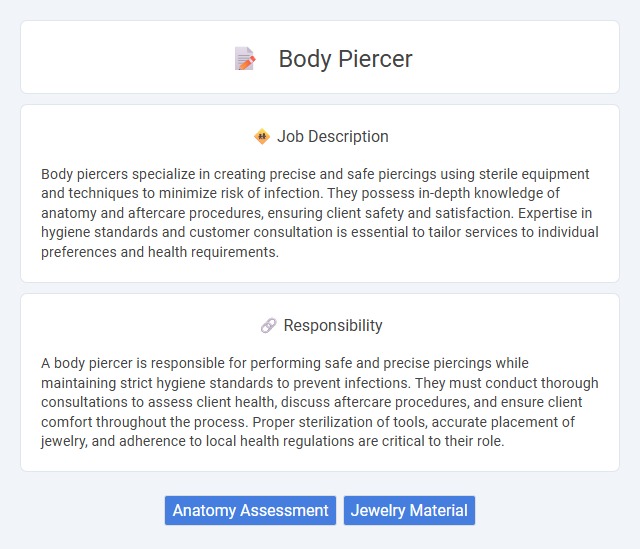
Body piercers specialize in creating precise and safe piercings using sterile equipment and techniques to minimize risk of infection. They possess in-depth knowledge of anatomy and aftercare procedures, ensuring client safety and satisfaction. Expertise in hygiene standards and customer consultation is essential to tailor services to individual preferences and health requirements.
People with steady hands, strong attention to hygiene, and a calm demeanor are likely suitable for a body piercer job due to the precision and care required in the procedures. Individuals prone to anxiety or with difficulty managing stress may find this role challenging, as working with clients during potentially sensitive moments can require emotional resilience. Those comfortable maintaining strict sanitation standards and engaging with diverse clients probably have a higher chance of thriving as a body piercer.
Qualification
A body piercer must possess thorough knowledge of human anatomy, especially skin layers and nerve locations, to ensure safe and precise piercings. Certification from a reputable body piercing or tattooing school that emphasizes hygiene, sterilization, and infection control is essential. Strong artistic skills and excellent communication abilities enable effective client consultations and customized piercing placements.
Responsibility
A body piercer is responsible for performing safe and precise piercings while maintaining strict hygiene standards to prevent infections. They must conduct thorough consultations to assess client health, discuss aftercare procedures, and ensure client comfort throughout the process. Proper sterilization of tools, accurate placement of jewelry, and adherence to local health regulations are critical to their role.
Benefit
Body piercers probably experience benefits such as creative expression and personal fulfillment by transforming clients' appearances. The job may offer flexible hours and opportunities to build a loyal clientele, potentially leading to steady income. Moreover, gaining expertise in hygiene and safety standards could enhance professional credibility and client trust in this growing industry.
Challenge
Body piercer jobs likely involve navigating challenges related to maintaining strict hygiene standards and ensuring client safety during procedures. The role may require dealing with clients' anxieties and managing varied pain thresholds while delivering precise and aesthetically pleasing results. Adapting to evolving trends and mastering new techniques could also present ongoing professional challenges.
Career Advancement
Body piercers can advance their careers by gaining certifications from reputable organizations such as the Association of Professional Piercers (APP), enhancing their credibility and skill set. Building a strong portfolio of diverse piercings and client testimonials helps to attract high-profile clients and opportunities for apprenticeship or salon ownership. Networking at industry conventions and continuously updating knowledge on hygiene standards and new piercing techniques are essential for professional growth and higher earning potential.
Key Terms
Anatomy Assessment
A body piercer requires thorough knowledge of human anatomy to perform safe and precise piercings, minimizing risks of nerve damage, infection, and improper placement. Expertise in assessing skin thickness, blood vessels, and underlying structures is essential for customizing each piercing according to individual body variations. Mastery in anatomy assessment ensures client safety, optimal healing, and aesthetic results in various types of body modifications.
Jewelry Material
Body piercers work primarily with high-quality jewelry materials such as surgical stainless steel, titanium, niobium, and 14k or 18k gold to minimize risks of allergic reactions and infections. These materials are biocompatible, ensuring safe healing processes and long-term wearability. Proper knowledge of hypoallergenic metals is essential for body piercers to provide safe and durable piercings.
 kuljobs.com
kuljobs.com